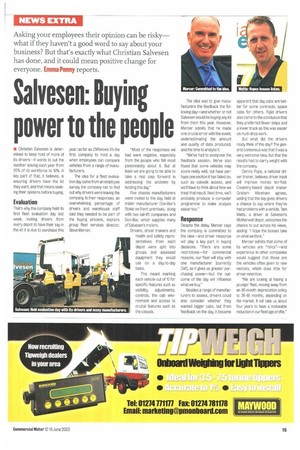Salvesen: Buying power to the people
Page 15

If you've noticed an error in this article please click here to report it so we can fix it.
Asking your employees their opinion can be risky— what if they haven't a good word to say about your business? But that's exactly what Christian Salvesen has done, and it could mean positive change for everyone. Emma Penny reports.
• Christian Salvesen is determined to keep hold of more of its drivers—it wants to cut the number leaving each year from 20% of its workforce to 10%. A key part of that, it believes, is ensuring drivers have the kit they want, and that means seeking their opinions before buying.
Evaluation
That's why the company held its first fleet evaluation day last week, inviting drivers from every depot to have their say in the kit it is due to purchase this year; as far as CMknows it's the first company to hold a day when employees can compare vehicles from a range of manufacturers.
The idea for a fleet evaluation day came from an employee survey the company ran to find out why drivers were leaving the company. In their responses, an overwhelming percentage of drivers and warehouse staff said they needed to be part of the buying process, explains group fleet services director, Steve Mercer. "Most of the responses we had were negative, especially from the people who felt most passionately about it. But at least we are going to be able to take a real step forward in addressing the problem by holding this day."
Five chassis manufacturers were invited to the day, held at trailer manufacturer Don-Bur's Stoke-on-Trent premises, along with two tail-lift companies and Don-Bur, which supplies many of Salvesen's trailers.
Drivers, driver trainers and health and safety representatives from each depot were split into groups and assessed equipment they would use on a day-to-day basis.
This meant marking each vehicle out of 10 for specific features such as visibility, adjustments, controls, the cab environment and access to crucial features such as the catwalk. The idea was to give manufacturers the feedback the following day—and whether or not Salvesen would be buying any kit from them this year. However, Mercer admits that he made one crucial error with the event; underestimating the amount and quality of data produced, and the time to analyse it.
`We've had to postpone the feedback session. We've also found that some vehicles may score really well, but have perhaps one section it has failed on, such as catwalk access, and we'll have to think about how we treat that result. Next time, we'll probably produce a computer programme to make analysis easier too."
Response
Despite the delay, Mercer says the company is committed to the idea—and driver response will play a key part in buying decisions. "There are some restrictions—for commercial reasons, our fleet will stay with one manufacturer [currently Dafl, as it gives us greater purchasing power—but the outcome of the day will influence what we buy."
Besides a range of manufacturers to assess, drivers could also consider whether they wanted bigger cabs, but from feedback on the day, it became apparent that day cabs are better for some contracts, space cabs for others. Rigid drivers also came to the conclusion that they preferred fewer steps and a lower truck as this was easier on multi-drop work.
But what did the drivers really think of the day? The general consensus was that it was a very welcome idea, but that the results had to carry weight with the company.
Dennis Pope, a national driver trainer, believes driver input will improve morale ten-fold; Coventry-based depot trainer Graham Wareham agrees, adding that the day gives drivers a chance to say where they've had problems with a vehicle. Tam Watts, a driver at Salvesen's Motherwell depot, welcomes the chance to put across his views, adding: 1 hope the bosses take on what we think."
Mercer admits that some of its vehicles are "relics"—and experience in other companies would suggest that those are the vehicles often given to new recruits, which does little for driver retention.
'We are looking at having a younger fleet, moving away from an 80-month depreciation policy to 36-48 months, depending on the market. ft will take us about four years to have a noticeable reduction in our fleet age profile."












































































































































































